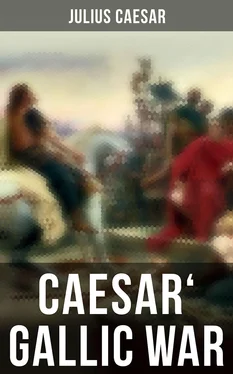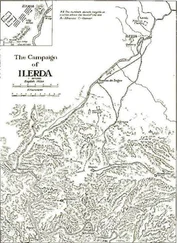XVI.—After he had made three days' march through their territories, he discovered from some prisoners, that the river Sambre was not more than ten miles from his camp: that all the Nervii had stationed themselves on the other side of that river, and together with the Atrebates and the Veromandui, their neighbours, were there awaiting the arrival of the Romans; for they had persuaded both these nations to try the same fortune of war (as themselves): that the forces of the Aduatuci were also expected by them, and were on their march; that they had put their women, and those who through age appeared useless for war, in a place to which there was no approach for an army, on account of the marshes.
XVII.—Having learnt these things, he sends forward scouts and centurions to choose a convenient place for the camp. And as a great many of the surrounding Belgae and other Gauls, following Caesar, marched with him; some of these, as was afterwards learnt from the prisoners, having accurately observed, during those days, the army's method of marching, went by night to the Nervii, and informed them that a great number of baggage-trains passed between the several legions, and that there would be no difficulty, when the first legion had come into the camp, and the other legions were at a great distance, to attack that legion while under baggage, which being routed, and the baggage-train seized, it would come to pass that the other legions would not dare to stand their ground. It added weight also to the advice of those who reported that circumstance, that the Nervii, from early times, because they were weak in cavalry (for not even at this time do they attend to it, but accomplish by their infantry whatever they can), in order that they might the more easily obstruct the cavalry of their neighbours if they came upon them for the purpose of plundering, having cut young trees, and bent them, by means of their numerous branches (extending) on to the sides, and the quick-briars and thorns springing up between them, had made these hedges present a fortification like a wall, through which it was not only impossible to enter, but even to penetrate with the eye. Since (therefore) the march of our army would be obstructed by these things, the Nervii thought that the advice ought not to be neglected by them.
XVIII.—The nature of the ground which our men had chosen for the camp was this: A hill, declining evenly from the top, extended to the river Sambre, which we have mentioned above: from this river there arose a (second) hill of like ascent, on the other side and opposite to the former, and open from about 200 paces at the lowest part; but in the upper part, woody, (so much so) that it was not easy to see through it into the interior. Within those woods the enemy kept themselves in concealment; a few troops of horse-soldiers appeared on the open ground, along the river. The depth of the river was about three feet.
XIX.—Caesar, having sent his cavalry on before, followed close after them with all his forces; but the plan and order of the march was different from that which the Belgae had reported to the Nervii. For as he was approaching the enemy Caesar, according to his custom, led on (as the van) six legions unencumbered by baggage; behind them he had placed the baggage-trains of the whole army; then the two legions which had been last raised closed the rear, and were a guard for the baggage-train. Our horse, with the slingers and archers, having passed the river, commenced action with the cavalry of the enemy. While they from time to time betook themselves into the woods to their companions, and again made an assault out of the wood upon our men, who did not dare to follow them in their retreat further than the limit to which the plain and open parts extended, in the meantime the six legions which had arrived first, having measured out the work, began to fortify the camp. When the first part of the baggage-train of our army was seen by those who lay hid in the woods, which had been agreed on among them as the time for commencing action, as soon as they had arranged their line of battle and formed their ranks within the woods, and had encouraged one another, they rushed out suddenly with all their forces and made an attack upon our horse. The latter being easily routed and thrown into confusion, the Nervii ran down to the river with such incredible speed that they seemed to be in the woods, the river, and close upon us almost at the same time. And with the same speed they hastened up the hill to our camp and to those who were employed in the works.
XX.—Caesar had everything to do at one time: the standard to be displayed, which was the sign when it was necessary to run to arms; the signal to be given by the trumpet; the soldiers to be called off from the works; those who had proceeded some distance for the purpose of seeking materials for the rampart, to be summoned; the order of battle to be formed; the soldiers to be encouraged; the watchword to be given. A great part of these arrangements was prevented by the shortness of time and the sudden approach and charge of the enemy. Under these difficulties two things proved of advantage; (first) the skill and experience of the soldiers, because, having been trained by former engagements, they could suggest to themselves what ought to be done, as conveniently as receive information from others; and (secondly) that Caesar had forbidden his several lieutenants to depart from the works and their respective legions, before the camp was fortified. These, on account of the near approach and the speed of the enemy, did not then wait for any command from Caesar, but of themselves executed whatever appeared proper.
XXI.—Caesar, having given the necessary orders, hastened to and fro into whatever quarter fortune carried him to animate the troops, and came to the tenth legion. Having encouraged the soldiers with no further speech than that "they should keep up the remembrance of their wonted valour, and not be confused in mind, but valiantly sustain the assault of the enemy"; as the latter were not farther from them than the distance to which a dart could be cast, he gave the signal for commencing battle. And having gone to another quarter for the purpose of encouraging (the soldiers), he finds them fighting. Such was the shortness of the time, and so determined was the mind of the enemy on fighting, that time was wanting not only for affixing the military insignia, but even for putting on the helmets and drawing off the covers from the shields. To whatever part any one by chance came from the works (in which he had been employed), and whatever standards he saw first, at these he stood, lest in seeking his own company he should lose the time for fighting.
XXII.—The army having been marshalled, rather as the nature of the ground and the declivity of the hill and the exigency of the time, than as the method and order of military matters required; whilst the legions in the different places were withstanding the enemy, some in one quarter, some in another, and the view was obstructed by the very thick hedges intervening, as we have before remarked, neither could proper reserves be posted, nor could the necessary measures be taken in each part, nor could all the commands be issued by one person. Therefore, in such an unfavourable state of affairs, various events of fortune followed.
XXIII.—The soldiers of the ninth and tenth legions, as they had been stationed on the left part of the army, casting their weapons, speedily drove the Atrebates (for that division had been opposed to them), who were breathless with running and fatigue, and worn out with wounds, from the higher ground into the river; and following them as they were endeavouring to pass it, slew with their swords a great part of them while impeded (therein). They themselves did not hesitate to pass the river; and having advanced to a disadvantageous place, when the battle was renewed, they (nevertheless) again put to flight the enemy, who had returned and were opposing them. In like manner, in another quarter two different legions, the eleventh and the eighth, having routed the Veromandui, with whom they had engaged, were fighting from the higher ground upon the very banks of the river. But, almost the whole camp on the front and on the left side being then exposed, since the twelfth legion was posted in the right wing, and the seventh at no great distance from it, all the Nervii, in a very close body, with Boduognatus, who held the chief command, as their leader, hastened towards that place; and part of them began to surround the legions on their unprotected flank, part to make for the highest point of the encampment.
Читать дальше












